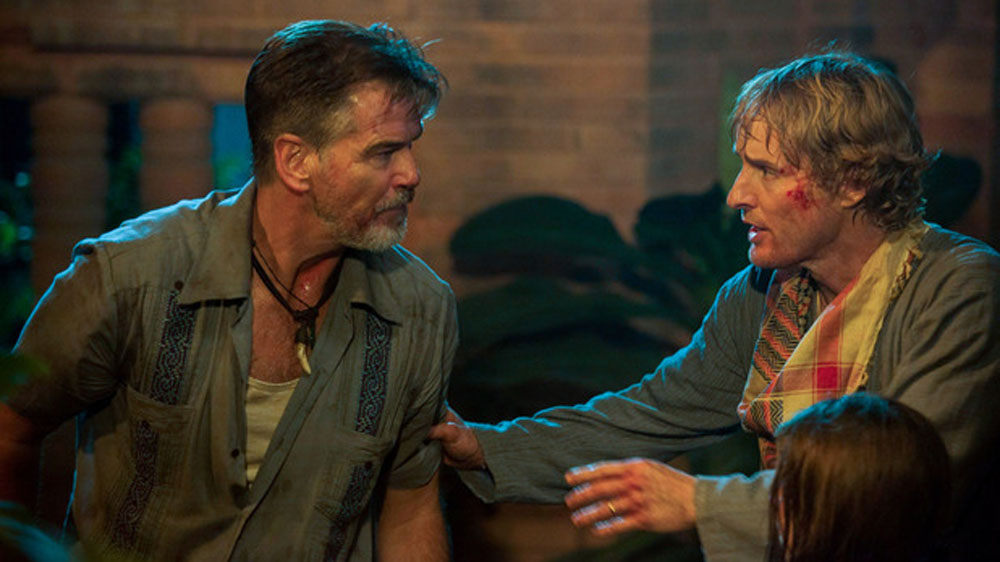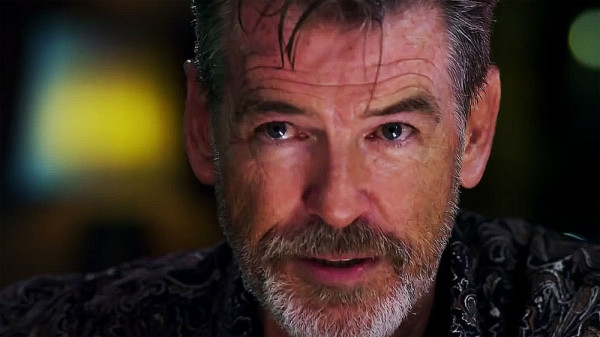Of all the actors to star in a gritty action film, Owen Wilson is probably pretty far down the list.
His lackadaisical comic timing is perfectly suited to comedy, but he’s never really shown that he has many more strings to his bow than that. No Escape might not prove that he’s a brilliant dramatic actor, but the fact that he’s very evidently not an action star works very much in his favour here.
The plot sees Wilson’s engineer Jack Dwyer flying his family to Southeast Asia to start a new life. His family – wife Annie (Lake Bell), and young daughters Lucy and Beeze (Sterling Jerins and Claire Geare) – have mixed feelings about the move, and while their fears are perfectly natural anxieties about uplifting their lives to the other side of the world, unbeknownst to them, a group of armed rebels are about launch a brutal coup and give them something to really be afraid of.
Wilson’s easy affability serves him well amid the growing chaos, as the rebels take to the streets and start hunting down tourists and Westerners, while Lake Bell’s vulnerability as she tries to protect her children is particularly authentic. Even the children aren’t too annoying.
Stealing the show, though, is former James Bond star Pierce Brosnan as a long-time ex-pat whom the family befriends over the course of their first day in Asia.
The overriding tone of No Escape is ultra-serious and one of grim nastiness – Brosnan, however, must have thought he was in a different film: his Hammond is a riot. He’s a welcome blast of comic relief in a film that rarely lets up the intensity. With any other actor in the role, Hammond may have jarred and been an awkward note amid all the earnest survival action, but Brosnan is so good that his sheer force of charisma carries him through.
Primarily, though, No Escape is an action/chase movie, and while it’s a passably good one, it’s not without serious issues. The action is decent, but it’s all rather improbable. The over-use of slo-mo to try and liven things up is a misjudgement, while some moments verge on the laughable – and not necessarily in the good way (at one point Jack has to very literally fling his young daughters from the roof of one building to another – it shouldn’t be funny at all, but you may well find yourself stifling a giggle).
There is genuine tension to be found, though, and the family’s bid for survival is soundtracked by a pleasingly propulsive score. Unfortunately, while the film’s oppressive atmosphere of claustrophobia is well conveyed – these are strangers in the middle of a warzone who don’t know the language or the lay of the land – the screenplay takes things a little too far at times, in ways that don’t feel natural.
The scenarios the family find themselves in are designed to ratchet up the sense of threat, but it begins to feel inorganic: the enemy enforcing actions that feel deliberately inserted just to shock. At times the film wallows in its own grimness, and it leaves a bad taste.
Not only that, but the film is problematic in its depiction of West vs. East. The story follows a group of innocent Westerners who are victimised by the savage foreigners. The film doesn’t feature a single sympathetic Asian character (bar a one-joke sidekick of Hammond’s who’s named Kenny Rogers because he’s obsessed with Kenny Rogers), and gives the locals no voice in proceedings.

The blanketing of the Asians as savages is compounded by the decision not to name the country the film takes place in – carrying the worrying connotation that this must just be what all of Asia is like.
The decision to not subtitle any of the marauding rebels’ dialogue is likely designed to put you further in the shoes of the Dwyer family – lost, confused and out of your depth – but the effect is actually that it robs the foreign characters of their identity. The film doesn’t even boast a recognisable lead baddie: in No Escape’s world, they’re all interchangeable, and all as bad as each other, and the only characters who matter are the white ones.
A short exchange in which it’s discussed that the rebel’s coup may well be justified due to decades of bad treatment and exploitation by the West may be valid, but it’s not enough on its own to detract from the unseemly way the non-white figures (it’s a stretch to call them ‘characters’) are displayed.
Curiously, the film that No Escape most resembles is tsunami drama The Impossible. In that film, a family of Westerners make their way to Asia, only to have their visit coincide with a catastrophic tidal wave. Swap the incredible tidal wave for a human wave of death and destruction, and you’ve more or less got the same film.
But while The Impossible was unrepentantly manipulative, it aimed to illicit tears via emotional family drama, while No Escape leans towards ugly cruelty that verges on torture porn.
There’s a decent action film lurking within No Escape, but you get the sense that director John Erick Dowdle (who also wrote the screenplay with brother Drew) might have needed someone to temper some of his more questionable excesses (it’s no surprise that his filmography tends towards horror).
The slick, snappy editing keeps things moving along at a pace, while the sense of panic and helplessness in a horrific scenario like this is well-conveyed. Sadly, though, No Escape can’t escape from its own ugly politics and tendency towards sadism.
Released in UK cinemas on Friday 4 September 2015.
> Follow Alex Mullane on Twitter.
What did you think of No Escape? Let us know below…

